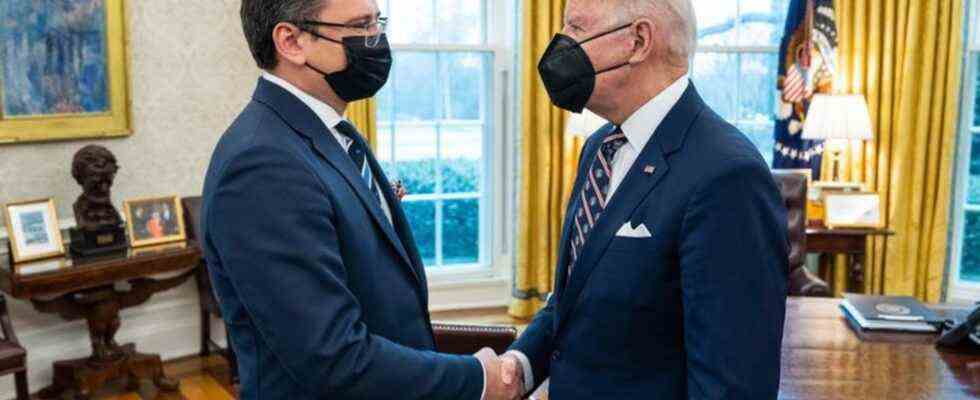Escalation of Moscow
Ukraine-Russia conflict: How the US and Europe are reacting
US President Joe Biden (r) welcomed Ukrainian Foreign Minister Dmytro Kuleba to the Oval Office of the White House on Tuesday. Photo: Adam Schultz/White House/Planet Pix via ZUMA Press Wire/dpa
© dpa-infocom GmbH
The reaction to Putin’s decision promptly came in the form of sanctions – some of which have now come into force. The Ukrainian ambassador to Germany fears that the consequences will come too late.
The United States and its allies have responded with a united front to Russia’s aggression against Ukraine: Japan, Australia and Canada followed suit with punitive measures after the European Union, Great Britain and the United States.
The sanctions are primarily aimed at Russian banks, business people and decision-makers who support President Vladimir Putin’s policies. According to the EU, Putin himself is not on the list.
The EU sanctions should come into force on Wednesday. Before the regular meeting of the federal cabinet, Chancellor Olaf Scholz (SPD) and the federal ministers responsible for security issues discussed the situation in the conflict between Russia and Ukraine.
Nord Stream 2 is on hold
On Tuesday, Scholz put the Nord Stream 2 Baltic gas pipeline, a Russian prestige project worth billions, on hold indefinitely. He thinks it is possible that the pipeline will never go into operation. The threat of higher gas prices came from Moscow.
On Monday, Putin recognized the independence of the separatist regions of Donetsk and Luhansk in eastern Ukraine and ordered the deployment of Russian soldiers. The Kremlin chief is planning an invasion of Ukraine for the second time since 2014. The West accuses Putin of violating international law. According to Western sources, Russia has gathered about 150,000 soldiers on the border with Ukraine.
The US threatens further sanctions
The government of US President Joe Biden announced the first punitive measures and threatened more. US Secretary of State Antony Blinken canceled a meeting planned for Thursday in Geneva with his Russian colleague Sergey Lavrov. The White House ruled out a meeting between Biden and Putin for the time being. Given the situation, the US is moving additional soldiers and equipment to Eastern Europe. Biden called Putin’s actions the “beginning of an invasion”. He continues to expect a large-scale attack: “We still believe that Russia is ready to go much further and launch a massive military strike against Ukraine.”
The new EU sanctions target the 351 members of the Russian parliament who voted to recognize the self-proclaimed People’s Republics of Luhansk and Donetsk. There are also penalties against 27 other people and organizations. Russia’s access to EU financial markets is to be curtailed and EU trade with the breakaway Ukrainian regions restricted.
The US government is taking action against two major Russian banks, the Russian government bond trade and supporters of Putin and their families.
Ukraine Ambassador: Sanctions may be too late
The Ukrainian ambassador to Germany welcomes the sanctions against Russia – but fears that they will come too late. Andriy Melnyk said on Wednesday on Deutschlandfunk that he very much appreciates the unity in the EU and the USA and the measures that have already been taken, such as the suspension of the German-Russian Nord Stream 2 gas pipeline. “We welcome all of this, only today it could be too late.”
Some of the sanctions that have now been decided are a good signal – but in his opinion these steps should have been taken immediately after the illegal annexation of Crimea eight years ago. “Today, of course, that has some impact, but probably not a dramatic one, on Putin’s determination to wage this war. And when I say “war” it literally means he wants to erase Ukraine from the map.” According to Melnyk, it is not just Ukraine that is at stake, but the entire free world.
Criticism of statements about arms deliveries
Meanwhile, Melnyk intensified the dispute over Germany’s no to arms deliveries to his country. Melnyk accused the chair of the Defense Committee, Marie-Agnes Strack-Zimmermann, of “pure cynicism” on Twitter on Wednesday. “Even if defensive weapons could save a single life of a soldier or civilian, this traffic light decision on arms deliveries would still be worth it. Instead, one is willing to simply accept the murder of hundreds of thousands,” he wrote.
In response, Strack-Zimmermann expressed understanding for Ukraine’s huge concerns, but the ambassador’s behavior in Berlin was disconcerting. To assume that Germany would carelessly accept hundreds of thousands of deaths would be “excessive”. This also applies to demands made only through the press that are not made to the federal government and to weapons that he knows Germany “does not even have”. Strack-Zimmermann: “He confuses friend and foe.”

